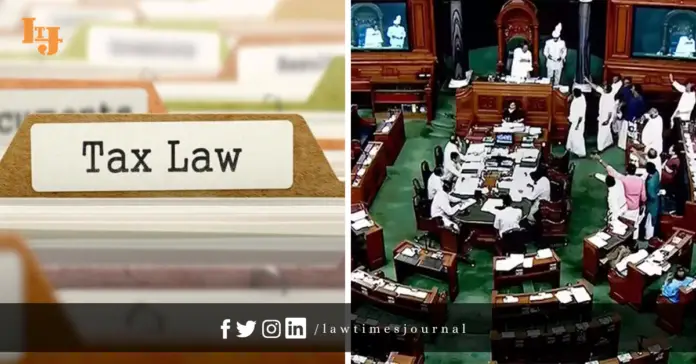
The Centre in the Lok Sabha on Monday moved the Taxation Laws (Amendment) Bill 2019 for its passage, seeking changes in the Income Tax law aimed at lowering tax rate options to domestic companies to promote growth and investment and attract fresh investment in the manufacturing sector.
Object:
The Bill seeking amendment to the Income-Tax Act, 1961 and to amend the Finance (No.2) Act, 2019 was moved in the House by Finance Minister Nirmala Sitharaman. The Taxation Laws (Amendment) Ordinance, 2019 was promulgated on September 20 to amend the IT Act and the Finance (No. 2) Act, 2019. It provides lower tax rate options to domestic companies to promote growth and investment and attract fresh investment in the manufacturing sector. The Bill was introduced in the House on November 25. Some provisions of the Bill are different from those of the Ordinance. The new corporate income tax rates in India will be lower than USA (27 percent), Japan (30.62 percent), Brazil (34 percent), Germany (30 percent) and is similar to China (25 percent) and Korea (25 percent). New companies in India with an effective tax rate of 17 percent is equivalent what corporates pay in Singapore (17 percent).
Minimum Alternate Tax (MAT):
MAT is the minimum amount of tax required to be paid by a company, in case its normal tax liability after claiming deductions falls below a certain limit. The Bill adds that the provisions regarding MAT credit will also not apply to companies opting for the new rates. The Ordinance reduces the MAT rate (applicable for companies not opting for the new tax rates) from 18.5 per cent to 15 per cent with effect from the financial year 2019-20. The Bill amends this provision by making it effective from the financial year 2020-21.
Previous Status:
Currently, domestic companies with an annual turnover of up to Rs 400 crore pay income tax at the rate of 25 per cent. For other domestic companies, the tax rate is 30 per cent. The Bill provides domestic companies with an option to pay tax at the rate of 22 per cent, provided they do not claim certain deductions under the Income Tax Act.
Key Features:
- The Bill provides new domestic manufacturing companies with an option to pay income tax at the rate of 15 per cent, provided they do not claim certain deductions.
- These new domestic manufacturing companies must be set up and registered after September 30, 2019 and start manufacturing before April 1, 2023.
- A company can choose to opt for the new tax rates in the financial year 2019-20 (assessment year 2020-21) or in any other financial year in the future.
- Once a company exercises this option, the chosen provision will apply for all subsequent years.
- Provisions regarding payment of Minimum Alternate Tax (MAT) will not apply to companies opting for the new tax rates.
- Corporate tax rate to be 22 per cent without exemptions.
- No Minimum Alternate Tax (MAT) applicable on such companies.
- Effective corporate tax rate after surcharge and cess to be 25.17 percent.
- To attract investment in manufacturing, local companies incorporated after October 2019 and till March 2023, will pay tax at 15 percent.
- That effective tax for new companies shall be 17.01 percent, including cess and surcharge. Companies enjoying tax holidays would be able to avail concessional rates post the exemption period.
- To stabilise flow of funds into the market the enhanced surcharge announced in Budget 2019 will not apply on capital gains arising on sale of any security, including derivatives by foreign portfolio investors (FPI).
- For listed companies which made announcement for public buyback before July 2019 it is provided that tax on buyback on shares of such companies will not be charged.
- In order to stabilise the flow of funds into the capital market, it is provided that enhanced surcharge introduced by the Finance (No.2) Act, 2019 shall not apply on capital gains arising on sale of equity share in a company or a unit of an equity oriented fund or a unit of a business trust liable for securities transaction tax, in the hands of an individual, HUF, AOP, BOI and AJP.
- The Government has also decided to expand the scope of CSR 2 percent spending. Now CSR 2% fund can be spent on incubators funded by Central or State Government or any agency or Public Sector Undertaking of Central or State Government, and, making contributions to public funded Universities, IITs, National Laboratories and Autonomous Bodies (established under the auspices of ICAR, ICMR, CSIR, DAE, DRDO, DST, Ministry of Electronics and Information Technology) engaged in conducting research in science, technology, engineering and medicine aimed at promoting SDGs.
Edited by J. Madonna Jephi
Approved & Published – Sakshi Raje
Reference:
- Press information Bureau, Corporate tax rates slashed to 22% for domestic companies and 15% for new domestic manufacturing companies and other fiscal reliefs, Posted on 20 September 2019
- Taxation (Amendment) Ordinance 2019








